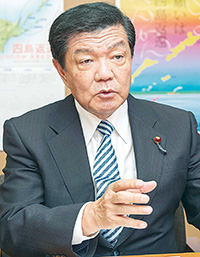
This year marks the 70th anniversary of Russia's illegal occupation of Japan's Northern Territories, located off the northeast coast of Hokkaido Island. The Party has declared September 3rd a day to protest these circumstances and has continued to provide its full backing to the government as it seeks a diplomatic solution, though one has not yet been found. We spoke with Yoshitaka Ito, a member elected from Hokkaido and the Vice-Chairperson of the Research Commission for the Northern Territories, about the prospects for return.
Q: Russia seems to be taking a hard-line stance. Prime Minister Medvedev and several other key government officials have recently visited the Northern Territories.
Ito: Prime Minister Medvedev has visited the territory three times, including visits while he was president. These would seem to be intentional acts, and influenced by the Crimea issue.
Japan is a country that acts on the basis of law and justice, and while the Northern Territories remain an issue, our position continues to be that we will not allow borders to be changed by force. During a telephone conference in June, Prime Minister Abe and President Putin confirmed that the dialog would continue. As a party, I think we need to rally behind Abe diplomacy so that we can see progress on this problem.
Q: What do you think are the keys to solving the territorial issues?
Ito: First, I would like to pay my respect to the former residents and the government officials who have spent the last 70 years tirelessly seeking the return of the islands.
Of the 17,000 residents of the islands at the time of the occupation, some 10,000 have already passed away, and the average age of the survivors is 80. This makes it imperative that we communicate the trials of these people and their love of the islands to younger generations.
I think we also need to do more to stir up public opinion by expanding the activities for the return of the Northern Territories by organizations that have been established in every prefecture in Japan, and by enhancing our education on these issues at the school level.
I believe the first step to solving the issue will be for each and every member of the Japanese public to understand the risks that the current state of affairs poses for Japan's sovereignty and territorial integrity.
Q: The territorial issues also affect other neighboring areas, don't they?
Ito: Ever since the illegal occupation of the Northern Territories, there have been serious impediments to the economic exploitation of the fishing resources that should have been available to Japan, and this has significantly affected the development of neighboring communities including Nemuro, Betsukai, Nakashibetsu, Shibetsu, and Rausu. Particularly in Nemuro, which is the main contact point with the Northern Territories, work has not moved forward as it should on the port and railway, and we need to continue to seek improvements in its functions and infrastructure from the government.
Russia has also banned net fishing of salmon and trout within 200 nautical miles, and this has been a major blow for local economies. The impact is estimated at 18.5 billion yen (Hokkaido government estimate). We need to start negotiating fishing rights with Russia as quickly as possible, and it is also urgent that we provide government assistance for changing fishing methods and identifying alternative sources of fish. Our Party is committed to working with the government and local communities to achieve this.










